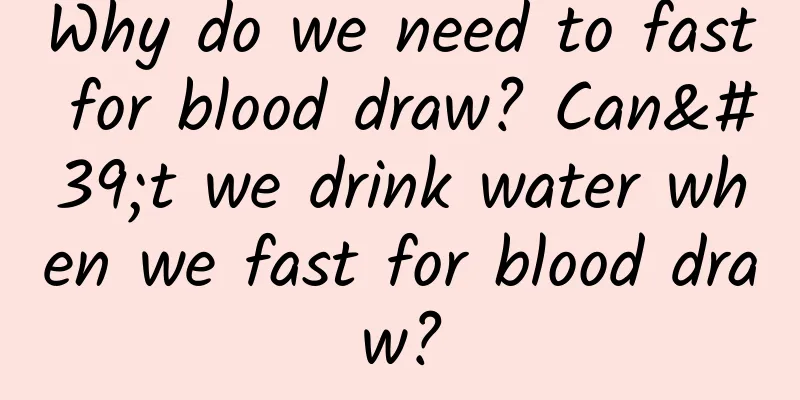Why do we need to fast for blood draw? Can't we drink water when we fast for blood draw?

|
We have all had physical examinations. During the physical examination, the blood test will be required to be fasting. This is because if you are not fasting, it may affect the examination results. So why do you have to fast for blood tests? Can't you even drink water? Why do we need to draw blood on an empty stomach?Because most of the tests that require fasting are liver function, kidney function, blood biochemistry (various ions), blood sugar, blood lipids, blood rheology, prenatal antibody screening and other tests. These items are easily affected by dietary factors. For example, a high-fat diet can affect blood lipid values. In order to avoid differences caused by dietary factors, when formulating the normal value ranges of these items, the values obtained from the fasting blood test of the normal population are obtained through statistical processing. Fasting blood draws can reduce the impact of dietary factors, make the test results more objective, and increase the accuracy of clinical judgment. Coagulation function, glycosylated hemoglobin, blood routine, erythrocyte sedimentation rate, immune tests, etc. should be done on an empty stomach as much as possible, and can be done without fasting if necessary. Generally speaking, fasting means not eating for 8 to 14 hours before the examination. For example, if you have a physical examination at 8 o'clock in the morning, then you should not eat after midnight the night before. Some people who undergo physical examinations are overly concerned about fasting, thinking that fasting means being hungry, and the longer you are hungry, the more accurate the indicators will be. Therefore, they skip meals or dinner the day before, which puts the body in a state of excessive hunger, or go to the hospital late for blood draws, which can also affect the test results. Because the human body has a strong self-regulatory function, when the body is in a state of hunger, various functional indicators in the body will change, so the blood sample collected may be distorted, affecting the doctor's judgment. The best time to have fasting blood drawn during a physical examination is between 6:30-9:30 in the morning, which not only meets the fasting requirement but also keeps the influence of physiological endocrine hormones in the body relatively stable. Can't I drink water when I have my blood drawn on an empty stomach?You can drink water, and drinking a small amount of water will not have a significant effect on the test. But avoid drinking a lot of water, because drinking too much water will dilute the blood and affect blood cell counts and other tests. On the morning of the physical examination, the person who has his blood drawn can drink a small glass of water (50-100ml of boiled water, generally not more than 200ml) at home after getting up to replenish the necessary water for the human body and take the medicines that must be taken every day, such as antihypertensive drugs, hypoglycemic drugs, anticoagulants, etc. Since there is at least half an hour from home to the hospital and then to your blood collection, these water can be completely absorbed and utilized by the human body and will not have any effect on the results of the physical examination. However, "water" containing sugar, protein and caffeine such as beverages, wine, strong tea, coffee, milk or yogurt should be prohibited. Do not drink water after arriving at the physical examination center, because this will affect the results of blood tests and urine routine tests. You can eat and drink water normally after completing all the fasting items. Blood draws that require fasting“Strictly fasting” blood drawing projectFasting blood sugar, blood lipids, renal function (mainly blood urea and blood uric acid), liver function (mainly bilirubin, transaminase), blood viscosity “Simple fasting” blood drawing projectCoagulation function, glycosylated hemoglobin, blood routine, erythrocyte sedimentation rate, all immune test items such as hepatitis B series, full set of hepatitis, various hormones, myocardial markers, thyroid function, tumor markers, autoantibodies, rheumatoid arthritis, etc. do not require strict fasting, only simple fasting is sufficient. Blood draw program without fastingOne situation is that patients who are re-examined within one year after surgery need to test various verification indicators, and they do not need to fast before blood draw. For patients suspected of infection, when blood is drawn for examination, they generally do not need to fast in advance, depending on the situation. Another situation is that some blood draws require "post-meal" measurements: blood sugar, C-peptide, insulin half an hour, 1 hour, 2 hours, 3 hours after a meal. Please strictly follow the doctor's instructions to get your blood drawn at the exact time after taking the sugar. |
Recommend
Can I drink burdock tea during menstruation?
Burdock tea is made from burdock, which is warm i...
Auntie's color is very dark
If you find that the color of your menstrual disc...
Causes of high cholesterol in thin women
The common reason for elevated cholesterol is a g...
What is the reason for Fan Kun
A normal mature woman produces an egg every month...
If there are two lines, one dark and one light, does it mean you are pregnant?
Nowadays, women all know how to use pregnancy tes...
Are there many people who don't bleed the first time?
Although social development advocates equality fo...
Is it true that the more you eat these fruits, the thinner you will be?
Losing weight is an eternal topic. No girl would ...
What to do if a girl has bad breath
I believe that for many girls, loving beauty is a...
Can women lose weight by practicing yoga?
In today's society, due to the improvement of...
What are the characteristics and historical value of the Terracotta Warriors? Where are the Terracotta Warriors located?
The Terracotta Warriors are a symbol of the matur...
What does a routine urine test for women check?
During the physical examination, urine routine te...
The process of having a child
The greatest person is our mother. She gave us li...
24-year-old boy contracted pneumonia after smelling his socks! Stop smelling stinky socks!
Audit expert: Zhu Guangsi Member of Beijing Scien...
Why does the car shock absorber squeak? What is the reason for the abnormal noise of the car shock absorber?
Shock absorbers are important components that ens...
What is the normal transverse diameter of the uterus?
The increase in the transverse diameter of the ut...









